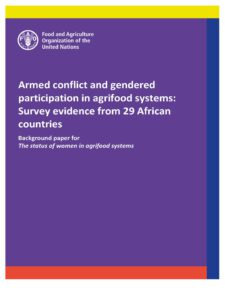This paper has since been updated and published in Global Food Security as a peer-reviewed article.
This paper provides empirical microlevel evidence on the gendered impacts of armed conflict on economic activity in agriculture and other sectors, combining large-N sex-disaggregated survey data with temporally and spatially disaggregated conflict event data from 29 African countries. We find that local conflict exposure is only weakly related to labour-force participation, but strongly reduces the total number of hours worked and increases engagement in the agricultural sector. These net impacts exist for both men and women. However, the reduction in hours worked is significantly greater among men, while the increase in agricultural activity is significantly greater among women. In the longer term, impacts of conflict on employment two years later are stronger when no more conflict ensues than if further conflict occurs, challenging the widespread idea of one-off conflict shocks fading away over time and suggesting that labour markets adapt to and absorb lasting conflict situations. Different types of conflict event have qualitatively similar impacts, which are strongest for explosions, such as from air strikes or landmines. Overall, our findings underline that armed conflict entails structural economic, social and institutional change, which creates complex, gendered impacts on economic activity.
This background paper was prepared to inform Chapter 5 of FAO’s report on The status of women in agrifood systems.
Publication Details
- Year of Publication: 2024
- Region/s: Sub-Saharan Africa
- Theme/s: Human Development · Humanitarian Emergencies · Individual Decision-making · Shocks & Livelihoods
- Research Topic/s: Agriculture · Conflict Measurement · Gender · Violence & Conflict
- DOI: https://doi.org/10.4060/cc9077en






